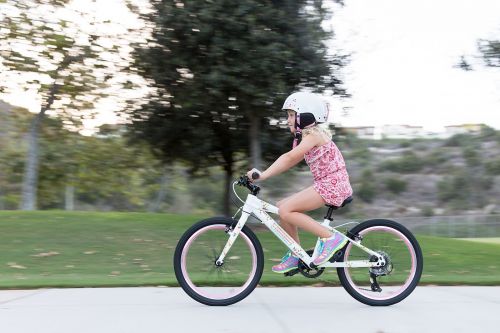BOULDER, Colo. (BRAIN) — Trade group PeopleForBikes is calling on its members to respond — quickly — to public requests from the domestic manufacturer Guardian Bikes and an aluminum trade group for steeper tariffs on imported bikes and e-bikes.
Guardian, which builds juvenile bikes at an Indiana factory and sells direct to consumers, has filed a public comment with the Bureau of Industry and Security at the Department of Commerce, requesting that the aluminum and steel content of all bicycles, frames and e-bikes imported into the U.S., from any country, be added to a list of items subject to a 50% tariff.
Guardian said reshoring bicycle and bicycle-frame manufacturing would eliminate over 200 million pounds of steel imports and 40 million pounds of aluminum imports.
"The domestic manufacturing sector holds untapped potential to support high-volume bicycle production," the company said.
"A scaled domestic supply chain for bicycles will spur demand for domestic steel and aluminum, as well as metal fabrication, welding, tool and die making skills necessary for reindustrializing the nation. Many existing machine shops and component suppliers currently serving the U.S. automotive industry are well-positioned to transition into manufacturing precision high-volume metal fabrication, welding, and component production could be leveraged to rapidly scale domestic bicycle component manufacturing," Guardian said in its comment to the BIS.
Currently, bikes and frames are not included on lists of “derivative” products subject to steel and aluminum tariffs, although some bike products, including steel chains, steel e-bikes and steel exercise equipment, including bike trainers, are on lists of derivatives subject to the material tariffs. Adding complete bikes, frames and e-bikes to the list of derivatives would make the value of the steel and aluminum content of the bikes subject to the tariffs.
Bikes, frames and e-bikes already are subject to the Trump administration’s "reciprocal" tariffs, which vary by nation, and long-standing duties. Bikes and frames from China also are subject to other tariffs, including Section 301 tariffs of up to 25%.
"We need your help if we are to have a reasonable chance of stopping these new, crushing tariffs.” — PeopleForBikes
The Aluminum Extruders Council, a trade group, left a comment with the BIS that included bikes, frames and e-bikes on a list of items it is requesting the BIS add to its derivative list. No other comments regarding bikes are currently posted.
PeopleForBikes is urging members to file comments with the BIS in opposition to the requests by Guardian and the Extruders Council.
“Our only opportunity to oppose these requested tariffs will end on October 21st when the two-week comment period closes,” the organization told members in an email on Wednesday. “PeopleForBikes will submit comments in opposition to these two requests and work with allies to do the same, but we need your help if we are to have a reasonable chance of stopping these new, crushing tariffs.”
PeopleForBikes has created a template and talking points for industry comments and has instructions on leaving comments on its website. The National Bicycle Dealers Association also shared the PeopleForBikes resources with its members in an email Thursday morning.
PeopleForBikes has supported federal legislation that would assist domestic bike assembly and manufacturing by reducing tariffs on components. Guardian has not shown support for that legislation.
Guardian’s history
Guardian was founded in 2013. Co-founder and CEO Brian Riley previously marketed the SureStop safety brake, intended to prevent front wheel lockups (The product was initially marketed under the SlidePad brand). The brake was offered as an original equipment product and spec’d by brands including Jamis and REI’s Novara. Later, citing a lack of interest in the brakes from major bike brands, Riley founded his own bike brand that spec'd the brakes exclusively. Guardian initially sold bikes through specialty dealers, but later shifted to a consumer-direct model.
In 2017, Guardian appeared on Shark Tank and Mark Cuban invested a reported $500,000. Cuban invested another $3 million in 2022.
This spring Guardian announced it had secured a $19 million credit facility with JPMorganChase to expand its Indiana factory. The factory initially has been assembling bikes with a mix of domestic and imported components. However Guardian announced on social media this week that it had begun frame production at the plant.
Guardian has said it produces 2,000 bikes a day with plans to make a half million bikes this year. Sales are estimated at $140 million. Its offerings range from $150 balance bikes up to 26-inch wheeled juvenile bikes that sell for $369.
Through a corporate representative, Riley has declined several requests for an interview from BRAIN since the financing announcement last spring.
In May Riley gave a speech to the Senate Committee on Small Business and Entrepreneurship in which he suggested the U.S. impose a $150 flat tariff on all bike imports. “A modestly protective tariff of $150 per bicycle would have the effect of reshoring most mass-market bicycle production while not materially affecting high-performance, limited-production imported bicycles,” he told the committee.
Note: Public comments regarding the steel and aluminum tariffs on the Department of Commerce site are at this link. PeopleForBikes urged that industry members respond to the Aluminum Extruders Council comment and the Guardian Bikes comment with information about their business, followed by arguments specific to that request. PeopleForBikes has created a template letter for brands to fill out and a talking points document to help those opposed to the tariffs to fill out the template.


